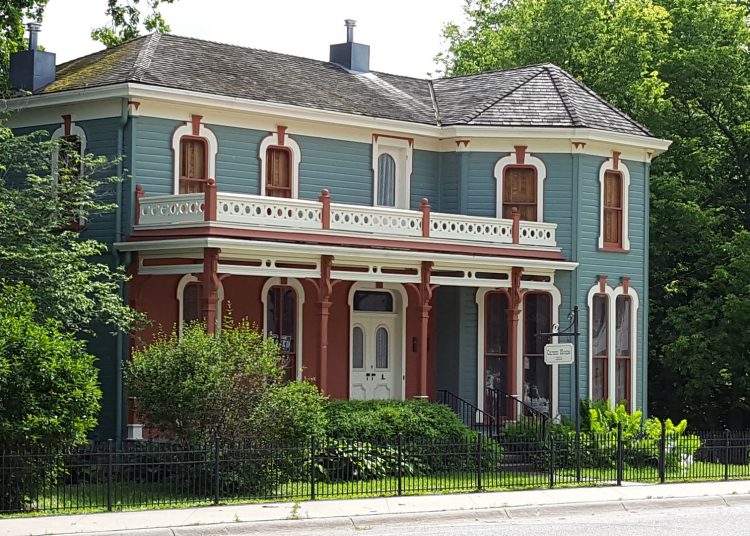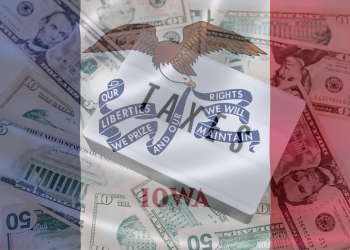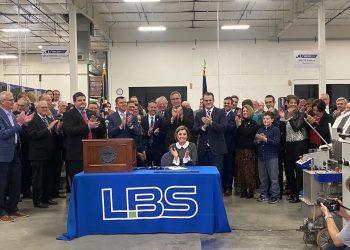For many Iowans, property taxes represent a significant financial burden. A recent independent poll commissioned by TEF Iowa found that close to 50 percent of Iowans surveyed support making property tax relief a priority.
Did you know property taxes are a form of a wealth tax? It is true! For example, if a home’s value increased by 10 percent, it does not mean the property owner has a 10 percent increase in savings to cover your property tax. “Local property taxes are also wealth taxes. They are paid by owners of residential, commercial, and industrial real property. U.S. property taxes are relatively high,” stated Chris Edwards, Director of Tax Policy Studies at the Cato Institute.
In a forthcoming paper Dr. Eugene F. Fama, a Professor of Finance at the University of Chicago, argues, property taxes “paid by a homeowner is in effect an income tax on housing services.” “It is an income tax when the homeowner rents the house to somebody else. It’s a consumption tax when the homeowner lives in the house and so consumes its services,” wrote Fama.
To illustrate his point Fama uses an example of a home in Chicago:
“The annual property tax on my Chicago home is about 1% of the market value of the house. Suppose the market value of the house is $1 million, so the annual property tax is $10,000. Suppose annual rental rates in Chicago are about 5% of house value or $50,000 for a $1 million house. The $50,000 annual rent is an estimate of the annual value of housing services provided by the house. If I rent the house to someone, I get $50,000 per year in rental income. If I live in the house, I consume $50,000 worth of housing services. The $10,000 annual property tax is thus a 20% tax on annual rental income or annual housing consumption.”
John Phelan, an economist with the Center for the American Experiment, argues that having an “expensive house does not necessarily mean you have fat piles of cash piled up ready for the taxman. And just because your house has risen in some assessed value, that doesn’t mean that the amount of liquid cash you have on hand to meet the increased liability has risen.” “You pay tax in cash, not with assets. But having assets is not the same thing as having cash,” stated Phelan.
What can be done to ensure that all Iowans receive property tax relief? The objective of property tax reform should not be to single out certain classes of property but rather ensure all Iowans receive tax relief. In addition, property tax relief should not favor one class of taxpayer over another. For example, it is often argued that senior citizens on fixed incomes should have targeted property tax relief, but the danger in applying this targeted relief is that it shifts the tax burden to other taxpayers. The fixed income argument also becomes relative because the senior citizen may be on a fixed income, but so is the family with both parents working and trying to provide for their family.
If the goal is to ensure all Iowans receive property tax relief, then the best approach is to strengthen the 2019 property tax transparency and accountability measure by requiring a Utah-style Truth-in-Taxation process. Utah’s Truth-in-Taxation law not only provides accountability in transparency, but it is also based on the revenue side. As Howard Stephenson, President of the Utah Taxpayers Association, explains:
“Truth-in-Taxation is a revenue-driven system, not a rate-driven system. Generally, as valuations of existing property increase from county assessors’ annual adjustments of taxable property values to keep pace with market values, property tax rates decrease. This automatic reduction in property tax rates prevents local governments from getting a windfall simply because valuations of existing properties have increased.”
If a local government wants to exceed the certified tax rate, it then requires a Truth-in-Taxation hearing that is accompanied by an extensive public notification and hearing process. Truth-in-Taxation also forces local government officials to take recorded votes to approve an increase in tax collections.
Through the Truth-in-Taxation process, local governments must justify why they want to increase taxes for additional spending, forcing them to be more transparent as to why they need additional tax revenue.
A crucial aspect of Utah’s law is a direct notification requirement, where notices are sent to taxpayers, providing information on the proposed tax increase. It also includes the date, time, location of the Truth-in-Taxation budget hearing. This extensive public notification and hearing process has been successful, and taxpayers in Utah actively participate in Truth-in-Taxation hearings.
Iowa could implement a similar direct notification system either by e-mail or mail to let property taxpayers know of a potential tax. Iowa property taxpayers deserve greater transparency in understanding their total property tax bill. This will help prevent local governments from hiding windfalls from increased assessments.
Another solution for property tax relief is to strengthen the 2 percent “soft cap” placed on city and county budgets. Part of the 2019 property tax transparency law requires county and city governments to hold a public hearing if the proposed budget increases more than two percent above the previous year and a supermajority vote for the increase to be enacted. This new 2 percent “soft cap” is meant to control the growth of property taxes and require local governments to provide more transparency. School districts were excluded even though they consume a large portion of property taxes.
Implementing a stronger tax and spending limitation on all local governments would help control the growth of property taxes in Iowa. Tax and spending limitations can be an effective means of controlling the growth of both government and taxes. Spending limitations also avoid the problem of interfering with the market to determine property valuations.
During the last legislative session in Iowa, a property tax reform bill was introduced, which in part would reform the 2019 law by lowering the 2 percent budget increase to 1 percent and would require the budget increase to be approved by voters during an election. The budget increase would need to pass by 60 percent in order to be implemented.
By forcing local governments to require a vote of the people to raise spending, it forces local officials to be more accountable and to justify new spending. It would also allow taxpayers to decide whether an increase in government spending is justified.
To achieve true property tax relief, local government spending must be addressed. It would be a mistake to consider raising or creating new taxes to “buy down” property tax rates. In fact, Iowa has already tried this approach. In 1934, the income and sales tax was created to lower property taxes. Today, Iowa not only has high property taxes but high income and sales taxes.
The late Senator Barry Goldwater wrote, “government does not have an unlimited claim on the earnings of individuals.” Further, Goldwater argued that “one of the foremost precepts of natural law is man’s right to the possession and use of his property.” Goldwater explained that an individual’s property is not just land or a house, but also earnings. High property taxes not only threaten an individual’s or business’ property but their earnings as well.















